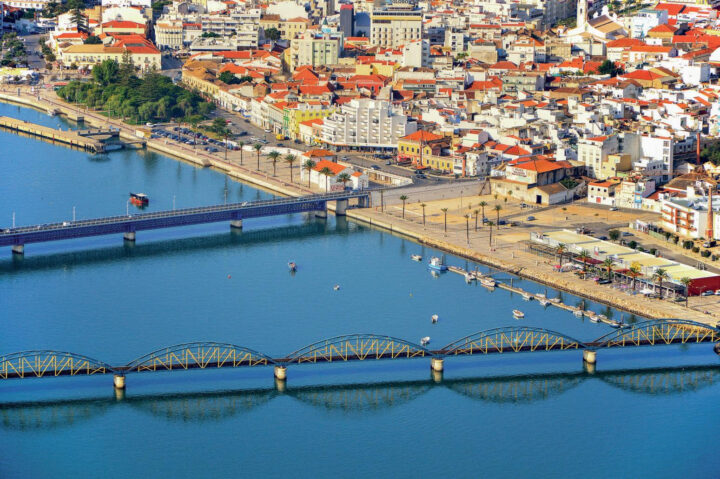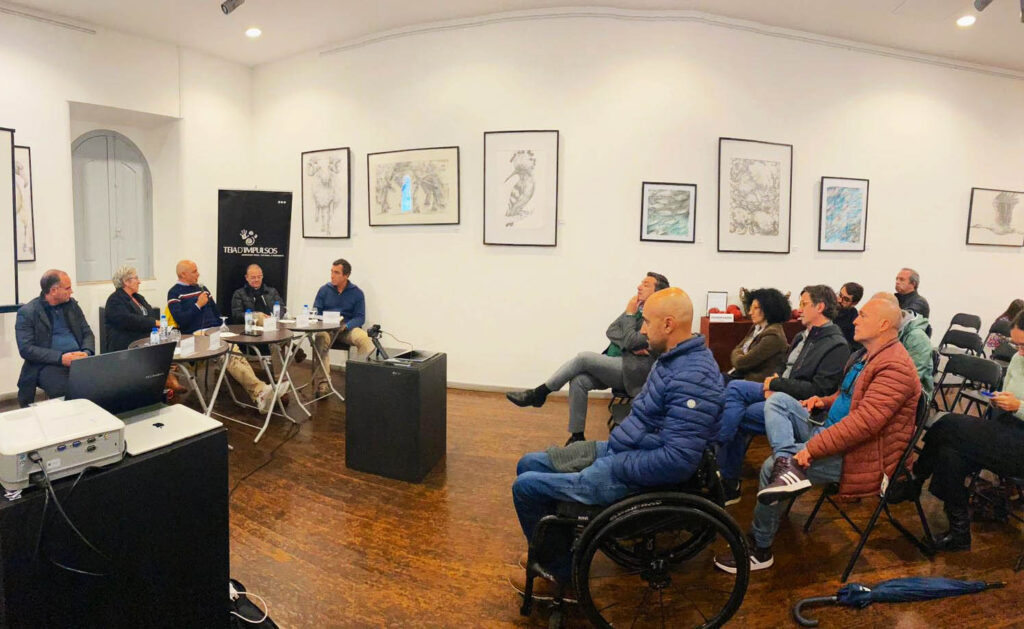A few days before the beginning of the year in which the 50th anniversary of the establishment of democracy in Portugal and the 100th anniversary of Portimão's status as a city will be celebrated, the Teia D'Impulsos association promoted a debate on the theme «Portimão, a city in construction".
Having as guests Marco Rodrigues (ARQ10) from the architecture area, Rui Batalau (ISMAT) from the sports area, Rosa Littlechinho (GRATO) from the social area, and Júlio Ferreira (Alvor FM and Choque Frontal ao Vivo) from the culture area, and with an eclectic audience and the presence of João Gambôa, councilor of the Municipality of Portimão, and Isabel Soares, head of the Division of Museums, Heritage and Historical Archives, the debate «was rich, divergent and ideas were launched that should be taken into account counts for the construction of Portimão", highlights Luís Brito, president of Teia d'Impulsos, who was responsible for moderating.
A lot was said, all of them important and relevant, because «building a city cannot involve simply comparing it with other cities, often much superior to Portimão, nor by implementing personal desires in the expectation of solving problems», he adds.
The issue of traffic in Portimão, according to Marco Rodrigues, does not involve removing cars from the city center, but rather opening roads and connecting spaces, it involves planning the interconnection between infrastructures based on social and economic dynamics, based on space and the appreciation of what exists.
In the area of education, Rui Batalau expressed the reality of teachers, which we all know through television, and which has worsened with the arrival of a very significant number of immigrants.
The lack of recognition and respect for the teaching career, associated with the lack of conditions to pursue it and the challenges posed by the diversity of nationalities, cultures and habits, is currently affecting not only the training of these immigrant students but also natives.
«Clearly, the training and education of all these Portuguese and foreign young people is being jeopardized, as a result of a lack of planning, reforms for teachers and infrastructure and equipment», says Luís Brito.
When it comes to sport, Rui Batalau highlights the urgency of building a City Park, where the approximately 60 thousand inhabitants of Portimão can, formally or informally, develop their physical fitness.
Likewise, he stated that he does not understand the non-existence of an Olympic swimming pool in the Barlavento Algarve, nor the inability that municipalities have demonstrated to join forces in a rational and sustainable management of the construction and management of sports teams of high relevance for the territory.
Rosa Littlechinho reported on the social aspects of GRATO, with special emphasis on the need to create conditions of support and humanization of the activities carried out, which are fundamental for the survival of many people and families.
He also mentioned that, instead of a generic lack of interest on the part of society, a result of some individualism, CLAS is an example of cooperation, sharing and support between the more than 50 institutions that, directly or indirectly, work in the social area in Portimão.

Today, culture is experiencing a growing moment in Portimão, but it is still a long way from what could constitute the operationalization of a strategic plan for Culture and which should begin in schools with cultural education actions.
An elitist program and, even more so, an elitist attitude promoted by the Teatro Municipal de Portimão (TEMPO), at its beginning, led to the population's alienation and the growing stigma that “TEMPO was only for some people”, which takes time to deconstruct and that created a gap between what should be the mission of equipment of this nature and what actually happened.
This reflection by Júlio Ferreira ended with a feeling of progressive change in cultural programming, no longer resulting from the will of one person and becoming part of a logic of diversity and the promotion of culture for all.
Before the public interventions, Isabel Soares and João Gambôa took the floor to explain the work that the Portimão Museum and Casa Manuel Teixeira Gomes develop with the community in general and young people in particular, as well as the invisible work that is carried out in the scope of research and preservation of the material and immaterial heritage of Portimão's history, as well as to explain the potential that Portimão represents in regional and national terms, reflected in the enormous demand for immigrants and investors.
The public took the opportunity to highlight the importance that everything to do with construction and development must be based on environmental responsibility and the sustainability of ecosystems.
The themes of immigrants and their importance in Portimão society were also addressed, as well as the role that tourism plays in the life of Portimão and the Algarve.
In conclusion, Luís Brito considers that «listening to society will have to be an unconditional practice of political power, in an exercise of providing citizens with proximity to political decisions».
On the other hand, «the sharing of resources by municipalities, in addition to representing rational and sustainable management, will provide greater and more equitable social development», and it is «imperative to build strategic plans so that development is guided and aligned within of each municipality and between municipalities».
Portimão is «a city in which construction with concrete is evident, but in which the City Park is still nothing more than ideas, ambitions, drawings and competitions. The City Park is a key element in the sustainable development of Portimão», he concludes.



















Comments